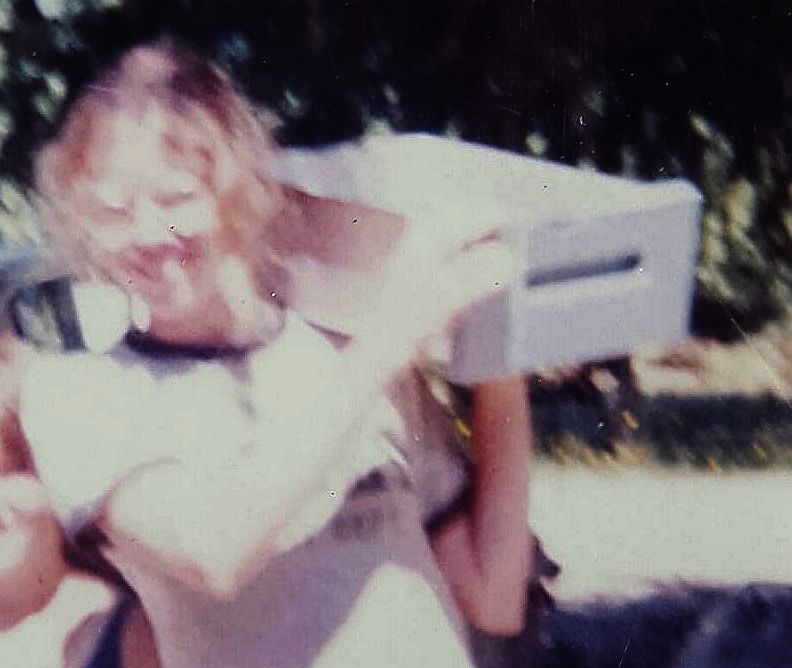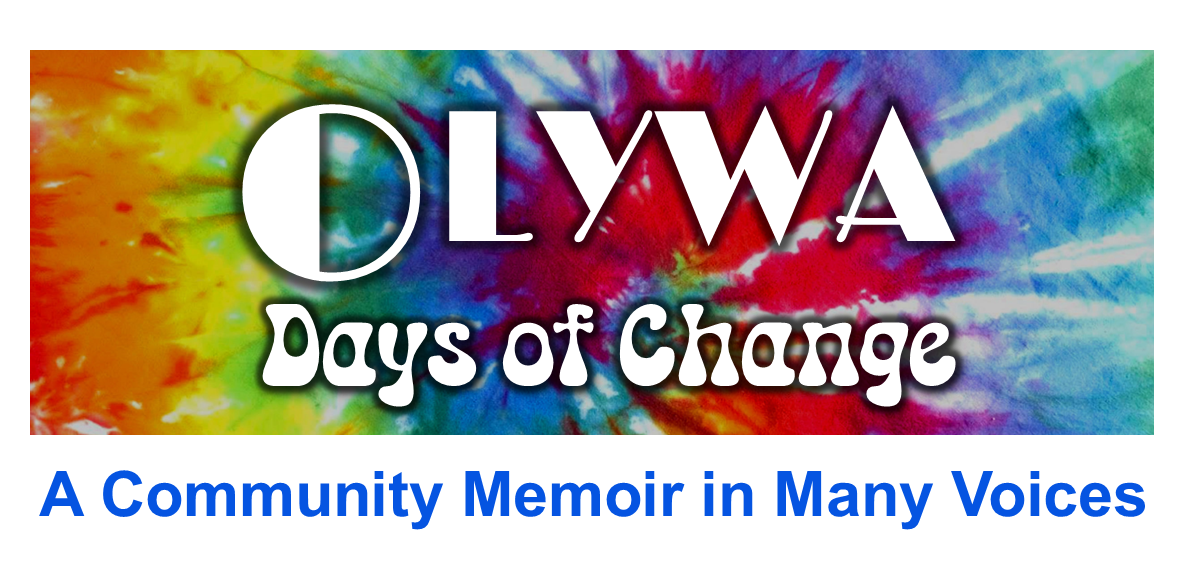FOOD
Laura May Abraham Booker and Food Co-ops
Excerpted from a 1988 Interview by Stephen Charak [1953 – 2004]
Originally published in Olympia: Voices
Stephen Charak: Laura May helped to form a food cooperative.
Laura May Booker: I was battling the obstacles of the young, struggling co-op, seemingly a band of freaks to most people.

Stephen: A long time friend, Barbara Trabka [1954 – 2006], described the place as, kind of the first Olympia Food Co-op. It was just a little house up on East Fourth Avenue. It was sort of a bunch of hippies that needed cheese.
Laura May: Really, it was an honorable thing. People were getting their food—that’s what it was all about. But we had a hard time. Let me put it this way—I always felt we were looked down upon.
Stephen: Laura May and Andrew moved closer to town.
Laura May: We lived out on the old Mud Bay highway. We knew no one here. [The Co-op] was functioning then up at the end of Bigelow Street. My friend Mary Lou Reslock got me involved, and we started mopping floors and stuff. There were problems with the building at this location and the second Co-op crumbled.
Stephen: The Co-op had less than a hundred members then.
Laura May: We had searched diligently for a place to go. Next we moved to the corner of Fifth Avenue and Jefferson downtown. There’s an empty lot at that corner now [in 1988]. There was a funky, old, two story dilapidated green apartment building on the corner and a woman real estate agent . . . showed us this apartment building. We asked if we could put a store there. She said, “You could do anything here. You could sell babies out the back door.” I never forgot that.
Stephen: The real estate agent told them that the location was zoned so that they could put a shop there.
Laura May: We moved the Food Co-op to this little apartment. Within two weeks, there were plain clothes detectives down there buying food and saying, “Hey—you can’t have a store in here. This is zoned wholesale warehouse.” This was back in the days of hippies with their dogs. Lots of hippies and lots of dogs. I went to City Hall to the Board of Adjustments meeting to try to get a variance. We lost. I had walked the boundaries of the interior of that wholesale warehouse district and counted nineteen retail businesses, including Safeway. Of course, they were grandfathered in and we were new. Our tactic was that the members really owned the food and this store was really just a point of exchange. We said it wasn’t a retail store, even though the detective had come and bought peanut butter.
There was an attorney who’d heard about us, and he offered his building on the west side, behind the car wash that’s up there now [1988]. It was a huge cedar building with no power and no water. But he offered it. We managed to hold off the city until December of that year. By that time, the Co-op had grown to some 300 members. We used to buy fish from the Skokomish Indians early in the morning and come back and clean them up in my yard on the westside, then take them and put them on ice in the bathtub and sell them to the members.
Stephen: Heat was provided by a pot bellied stove.
Laura May: It was cozy. You could sit in the kitchen of this little apartment with your feet up near the stove. When we first started using it, the fire department came down—in ‘full drag’ as Mary Lou said (in uniform)—with the clanging bell. They told us we couldn’t have a fire going in our place. In December of that year, on our last day, the water pipes broke in the floor and the place flooded. We got all the food out and we took it to my house on the west side.
Stephen: The next logical step was selling food out of her house.
Laura May: We used to get a delivery at that time from Oroweat. Since they delivered to us at the Co-op downtown, they also delivered at my house. The city didn’t know we had moved there, they didn’t pay attention to us at that point. We were out of the limelight. I was selling food and had buckets of cashew butter in my kitchen. Oroweat delivered until the supervisor came on the route one day with the driver. The supervisor took one look at the long chuck-holed driveway and this funky house with a bunch of hippies living in it . . .
Stephen: So much for bread delivery.
Laura May: Mary Lou and I organized the first food buying club at my house. I don’t know how many neighborhoods ordered from us. We’d go up to Seattle and buy our food from different suppliers of organic and natural foods. The neighborhood clubs then came to my house to pick up their orders. We did that a couple of times over a couple of months. It was a big food buying and distribution operation. Then we rented a duplex at Pear and Fourth Avenue on the east side. That was one of the first food co-ops that most people remember. That little duplex was so tiny. We painted it in all weird colors. After a short time, that Co-op closed.
Read the full transcript: Laura May Abraham—Section from Olympia: Voices © 1988 S. Charak
We encourage readers to contact us with comments and corrections. Disclaimer
